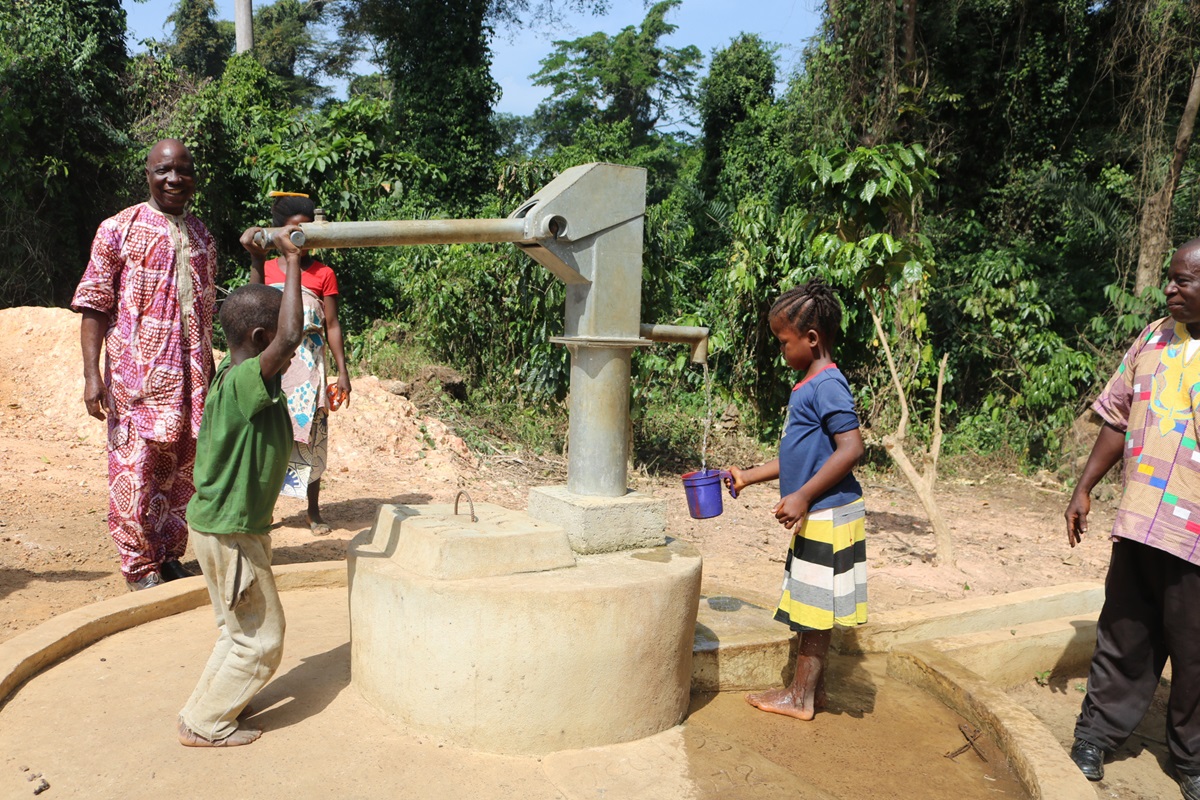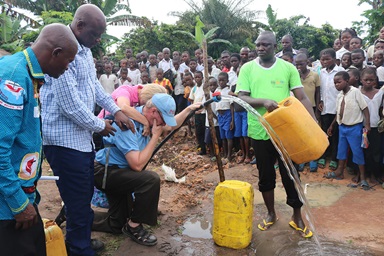Water for Life, a major project of The United Methodist Church in Liberia, has now crossed into Guinea, with plans to build at least five water wells in the country.
The first two wells were dedicated in Yassata and Burumma as part of the church’s Guinea Ministry, while the other three wells are undergoing construction in additional communities where The United Methodist Church has a presence.
The Rev. Pade Mietakor Kialen, associate director of the human rights department for The United Methodist Church in Liberia, said the decision to construct the water wells in Guinea grew out of the many requests from church members across the border.
“We have reports of people who died from waterborne diseases and we don’t want the same thing to happen to our young and small membership and the people here in Guinea,” he said.
The Guinea Ministry of the Liberia Conference includes 15 churches and is the denomination’s only presence in southeastern Guinea.
Kialen stressed that while the church is helping to improve health through safe drinking water, it is the responsibility of the people to care for the wells properly. He said the way in which communities handle the wells will determine if the church builds more wells in the area.
“Water is life. That is why your brothers and sisters overseas are funding the construction of these water wells throughout the Guinea Ministry,” he said.
Water for Life is a United Methodist Board of Global Ministries Advance project led by The United Methodist Church in Liberia. The church expects to spend more than $13,000 in Guinea, with each well costing about $2,650.
How to Help
“Our partners, especially St. Paul United Methodist Church in Rochester, Michigan, are standing with us in saving lives in both Guinea and Liberia through the provision of safe drinking water,” said Jefferson Knight, director of the Liberian church’s human rights department.
He pointed out that the provision of safe drinking water was his department’s initial engagement with the Guinea Ministry.
“What is done by Water for Life in this town will be remembered by the people of Yassata for a very long time,” said Yassata Town Chief Gede Kpomou.
Speaking during the dedication and presentation ceremony of the water well (known as a hand pump locally), Kpomou said he has been waiting all his life for the day that safe drinking water would be available in his town.
“There will be no more sicknesses from drinking unsafe water,” he said. “The United Methodist Church has made the dream a reality for all of us.”
Alphons Gbilimou, pastor of Yassata United Methodist Church, said the Water for Life project has brought life to the people of the community.
“Waterborne diseases will now be lower in the community since the people will be drinking this water,” he said, adding that the water well belongs to the community and its presence has increased the people’s trust in the church as a caring entity.
He said it is his hope that the church will continue to improve the living conditions of the people of Yassata by providing other social services, such as a school and hospital, as the church has done in other parts of Guinea.
“The people of Guinea are very keen on what the religious institutions are doing for them either by empowering them or caring for them,” he said.
Zuah Kpoghomou, a member of Yassata United Methodist Church, said the presence of the hand pump was a relief for many mothers, especially those with babies.
“We don’t have to walk long distances for water or send our children to the running creek that they may get drowned in,” she said.
The water well will be used by the entire community for drinking, while the creek water can be used for other chores in the home, she said.
Bartholomew Kpoghomou, the caretaker of the hand pump and lay speaker of Yassata United Methodist Church, said the pump is open in the morning and evening hours.
“We do not allow children to come to the pump without the help of an adult,” he said.
According to the Rev. Ebenezer Belleh, a supervising pastor residing in Diecke, the Guinea Ministry has expanded beyond its original purpose of serving Liberian United Methodist refugees in Guinea and is now serving the people of Guinea.
Belleh said the ministry is in partnership with several churches in the United States, including Geneseo United Methodist Church in New York, which is funding the construction of Bignamou United Methodist Church in Guinea.
He said the United Methodist Board of Global Ministries also is the major supporter of Diecke United Methodist Hospital and other projects through The United Methodist Church’s Imagine No Malaria program, the Nationals in Mission program and now the Water for Life project.
“Diecke United Methodist Hospital is the only referral hospital in this part of Guinea,” Belleh said, adding that surgical work is now being done in the hospital.
Started in 1997, the Guinea Ministry is still a part of the program areas of the Liberia Conference. More than two decades later, Belleh said he thinks it is time for the ministry to be declared a district of The United Methodist Church in Liberia.
Asked why the Guinea Ministry cannot become a provisional annual conference, Belleh said developing the leadership capacity of Guineans to take over the ministry was a challenge.
“Unless the general church can invest in the leadership development of Guineas who are willing to serve The United Methodist Church, this mission field will remain as it is.”
Swen is a communicator in Liberia.
News media contact: Vicki Brown, Nashville, Tennessee, (615) 742-5470 or [email protected]. To read more United Methodist news, subscribe to the free Daily or Weekly Digests
Like what you're reading? Support the ministry of UM News! Your support ensures the latest denominational news, dynamic stories and informative articles will continue to connect our global community. Make a tax-deductible donation at ResourceUMC.org/GiveUMCom.




